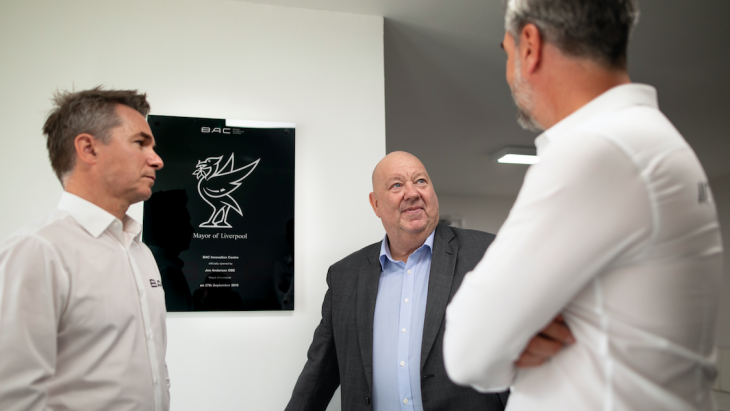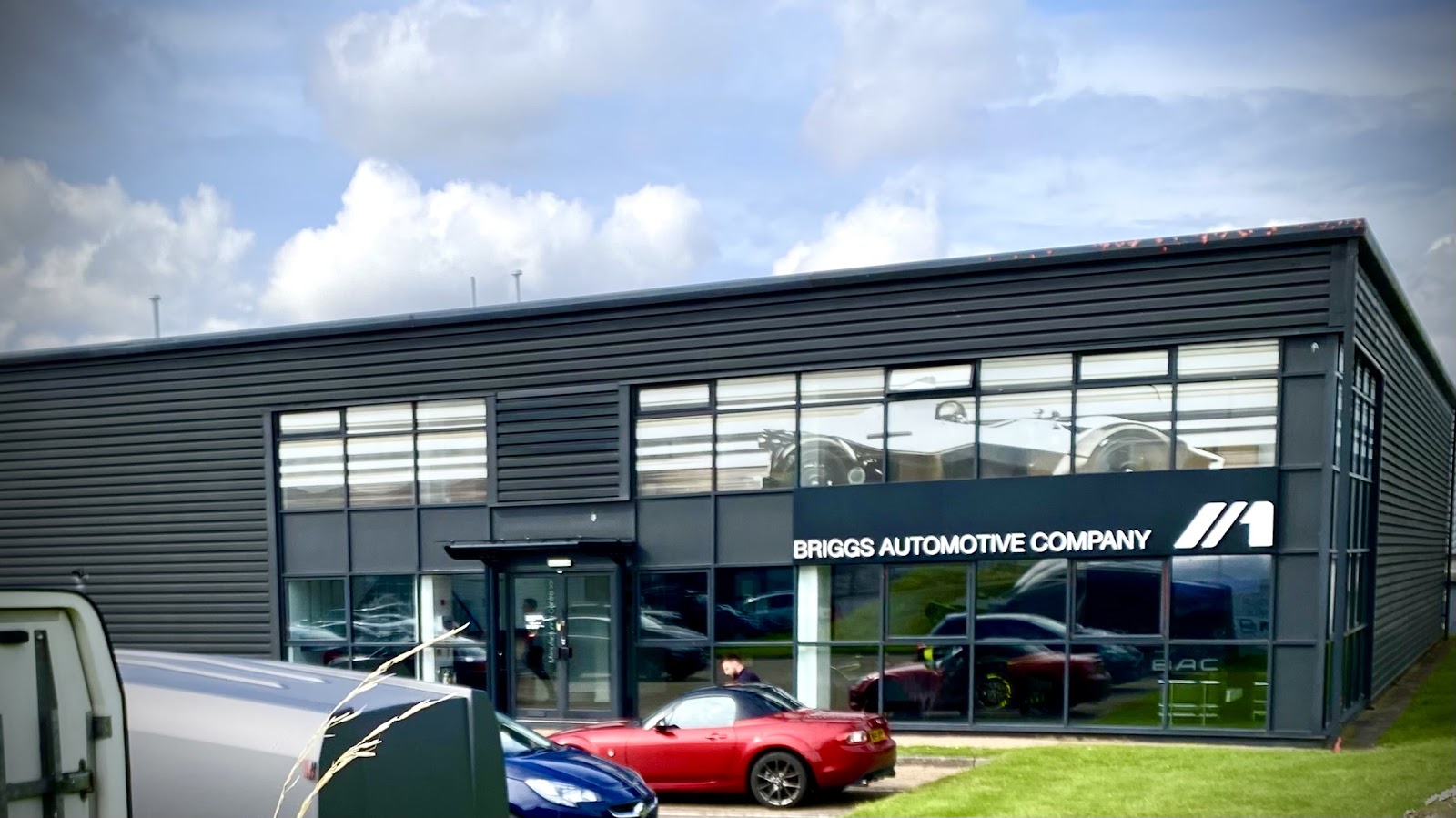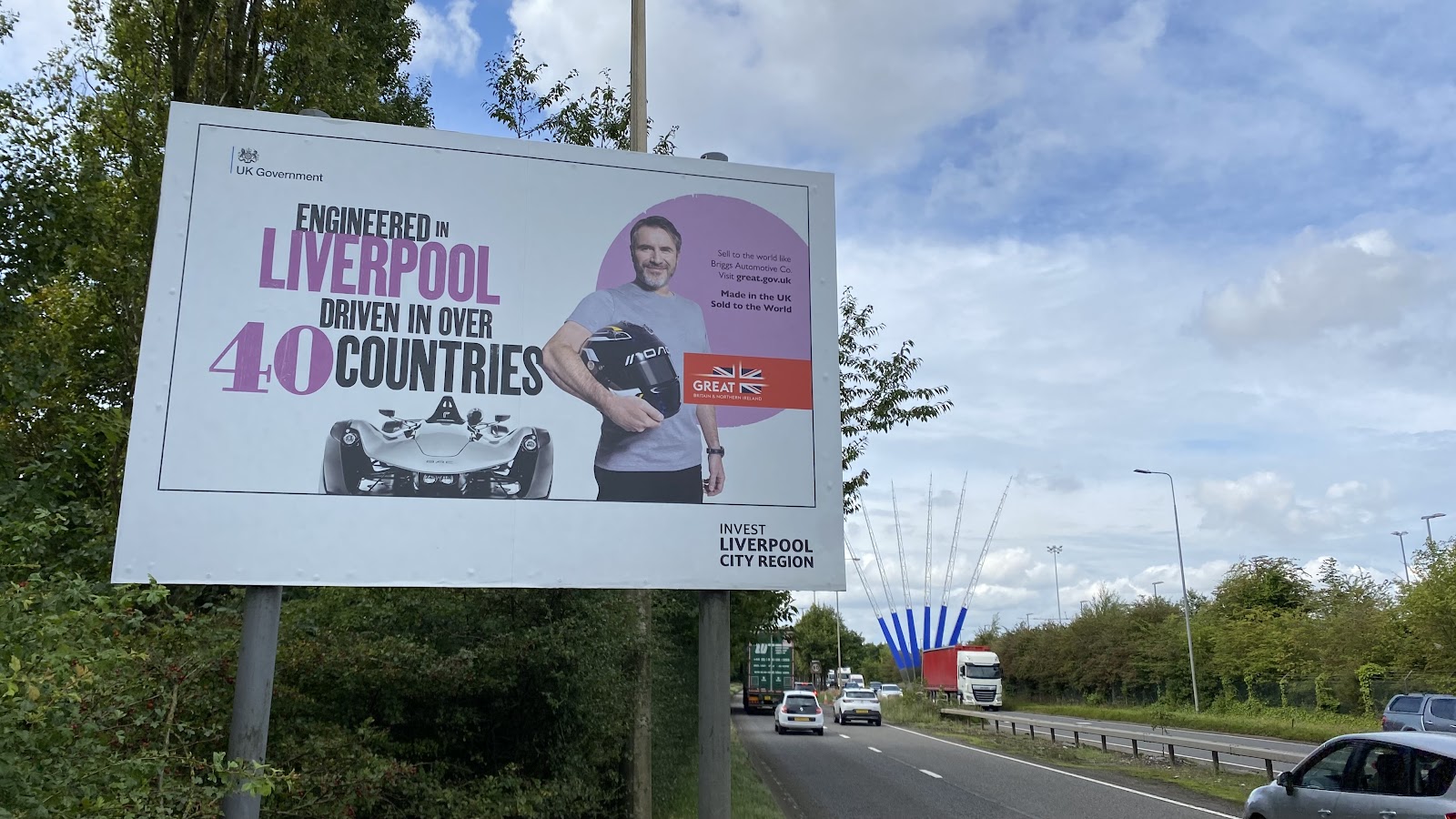How Liverpool City Council blew almost £1 million on supercars

The road to nowhere: The inside story of how 'invest to earn' crippled our finances
The Briggs Automotive Company is a local success story. Based in Speke, BAC makes a supercar called Mono — a £300,000 single-seater that looks like a cross between a Formula 1 racer and an alien spaceship. It’s the sort of spectacular machine you’d expect to see Lewis Hamilton flying round the track at Silverstone in, and not rolling out of an industrial estate in Runcorn. And yet, the company was founded in 2009 by two brothers from Widnes, Neill and Ian Briggs, who brought their design and engineering skills together. They kicked out the passengers to build a one-of-a-kind, one-seat, carbon fibre car that can zip along at 170 mph. It’s Britain’s only street-legal, single-seater sports car. There’s a famous clip of Jeremy Clarkson, squeezed behind the wheel in an open-air cockpit, his jowls hypnotically rippling at high speed with the wind. He’s driving a Mono.
Readers of the Echo will know a lot about the Mono. You can barely keep track of the number of Echo stories about BAC over the last decade; ‘BAC Mono supercar firm looks to move up a gear’, ‘Top Gear's favourite supercar is Liverpool-bound’, ‘New BAC Mono supercar will be more powerful than ever’, ‘Liverpool-built single-seater sports car wows on the French Riviera’. And on and on, ad infinitum.
The thrill of driving a race car that’s been adapted for everyday use may be easy for some to appreciate. But back in 2013, when Liverpool City Council was staring down a £330-million reduction in government funding, investing huge sums of money in a supercar for the super rich would not have seemed like an obvious thing to do. But that’s precisely what they did. This is the story of how that £1 million investment turned into £50,000, and why that matters.
Today, councillors are facing a vote on a budget with savings of nearly £49 million, while the number of children in care increases and our population grows older. From the pavements we walk to the care homes we may eventually move into, everything has gone under the knife. And facing a freeze on ‘non-essential’ spending, it’s essential for us to uncover and investigate those examples of possible financial mismanagement that may help illuminate the way to a brighter future.
As a freelance investigative journalist who’s worked for BBC Panorama, Channel 4 News, Newsnight and The Sunday Times, I’ve been digging into Liverpool City Council’s finances off-and-on for the best part of a decade. Pouring over company accounts and share dealings, trawling the archives of council minutes and decisions, reading press cuttings or watching old interviews, speaking to experts and insiders to map the unseen corporate connections and to follow the money. What exactly happened between the council and BAC might have taken a decade to unpick, but it paints as clear a picture as any of precisely how we ended up where we are, and how we might avoid it ever happening again.
Joe Anderson was elected mayor of Liverpool at a uniquely difficult time. A year into his term, austerity had undermined every aspect of publicly-funded life in the city. But as the Conservatives continued to claw back the bankers’ excess that had burst everyone else’s bubble, the constraints on how local authorities were allowed to invest were loosened. Chancellor George Osborne opened up the ‘alternative income streams’ that he hoped would help councils fill the gaping hole in their budgets.

This suited Anderson just fine. The mayor, embodying boss politics, would often say that he was determined and able to simply “make things happen”. His means of doing so? A strategy called “invest to earn”. If a private company could present a good enough business proposition, Anderson promised the council would borrow the money to spend on it, or lend the cash out at a higher interest rate. Either way, the returns Liverpool would make under the invest to earn strategy would help plug the widening government funding gap and keep the lights on in the Cunard.
That was the theory, anyway. In practice, many of the schemes delivered under the mayor’s recommendations for invest to earn would end up costing the city even more, or deliver very little except embarrassing headlines. There was the £5.5 million loan to the developer of apartments in Stanley Dock, to be repaid over two years, much of which is still outstanding after eight years. There was the £2 million ploughed into a pharmaceutical partnership with Redx that never materialised. There was the £4 million blown to buy unloved industrial land and launch an academy of road builders, which never opened. But one investment more than any other can act as a blueprint to understanding what went wrong. The BAC story is at the eye of a perfect storm, where a failure to hold authority to account collides with our desperate dwindling local government finances.
Which brings us back to Briggs. At its heart, this tragedy is actually a love story; the man who fell for a car he would never drive. During his leadership, Anderson was fond of saying things about the city's time in the "doldrums" having come to an end as investment and opportunity poured in. His infatuation with the Briggs Mono helped symbolise this exciting new era. BAC — with its very fast, very photogenic car sold in over 40 countries and driven by celebrities like Usher and a pre-antisemite Kanye West — was perfect.
In 2014, Anderson proudly announced that BAC was to relocate from Cheshire to Liverpool — Speke specifically — to make cars and ship them out to the world. Standing in their new workshop beside the sleek body of a Briggs Mono, the mayor proclaimed; “I’m never happier than when I’m here”. The company’s move was a coup for the man who makes things happen.
In a public display of the humility and personal honesty that got him elected, Anderson would later admit to his regret that he’d never take the Mono for a spin because he was too fat to squeeze behind the wheel. That didn’t stop him proudly positioning himself beside the car for countless photo opportunities, from Cannes to Goodwood and all points in between, to promote Speke as the manufacturing base for such a modern motoring marvel as the Mono. In Anderson’s eyes, the blinding sparkle of publicity this car brought was priceless. In reality, everything has a price.

The first named entry for BAC in the council’s archives appears tucked away at the end of a paragraph on page 5 in the foreword to the 2013/2014 accounts, the year invest to earn went live. It reads:
A number of smaller investments were made during the year in Briggs Automotive Company (BAC)... with the aim of creating jobs and economic growth.
The council gave its first chunk of cash to BAC in the 2013/14 year, in the shape of a so-called “repayable” grant amounting to £490,000. You wouldn’t be wrong in thinking the merits, risks and returns on such a sizable investment should be debated and carefully considered before a vote by councillors.
However, as the Local Government Inspector, Max Caller, pointed out; the lack of freely available and public documentation is a key feature of the way the council under Anderson operated. This makes it difficult to establish the terms under which this not-unsubstantial and repayable sum was to be pumped into the tanks to fuel a move across the Mersey. We have asked the council for more details and we’ve placed a Freedom of Information request in a bid to learn more. Nearly two months since we first posed our questions, and four days after our deadline, we finally did get a partial response from the council. When we’ve had time to digest that information, we’ll bring readers a full update.
That £490,000 may be crucial to understanding why a proper public paper trail is missing. Council rules mean that any spend of £500,000 or more bumps the payment into a category known as a “key decision”. Key decisions trigger a far higher level of transparency. When spending this much money, councillors and officers should get the chance to properly scrutinise the value for money of the deal. But if it’s kept even a smidge under half a million, it can be kept within a far tighter circle and is subject to much less public scrutiny.

That first decision to grant BAC with £490,000 of taxpayer cash was also pushed through the decision-making process using a technique known as ‘delegated authority’. This further reduced the opportunity for elected members to see what was going on. Using the power of delegated authority avoids all those annoying questions from councillors like; “how do we get our money back?” or “what do we get in return?” In effect, all the responsibility for making sure this deal was worth doing was abdicated to a tiny team of highly-paid employees and the veil of secrecy around the finer details was drawn tighter. The grant proposal was put before the council and the done-deal was rubber stamped.
A search of documents filed with Companies House shows that in June 2013, the council took two charges (a legal way of guaranteeing security on your loan) out against all of BAC’s estates and interests in any property they owned, as well as the intellectual property of the company. As mentioned above, this was security, offered in the event that Briggs were unable to repay what they owed. In return, the council agreed to give them financial help. Despite our attempts to establish why, the council has never made clear the terms of that grant. Previous attempts by others have hit the brick wall of an exemption provided to the council by the Freedom of Information Act under the heading “Commercial Confidentiality”.
All we know comes from a previous response published on WhatDoTheyKnow:
Briggs Automotive were provided with a repayable grant to invest in their car manufacturing process and to create up to 60 new long term employment opportunities. The grant is repaid in the event that they do not fulfil these criteria or they exceed a set level of profit.
BAC currently employs 24 staff and appears yet to return a profit.
What happened next is an even greater mystery and it’s a decision that, quite frankly, beggars belief. In 2018, the council made their second BAC investment decision. They agreed to swap the money the company still owed to the council for shares. The council paid £197.04 per share — 2,537 shares in all — and in return they wrote off the £500,000 repayable grant. As part of this new deal, the council also paid for services of £9,890.48. Paperwork filed with Companies House shows that on the day before this deal was due to go through, BAC split every one of their 203 existing shares that had a face value of £1 into 1,000. This created 203,000 new shares, each with a face value of £0.001p. The council had paid just shy of £500,000 for something that was worth £2.54 on paper.

On the same day that the council appeared to do the share swap for that repayable grant, BAC also created 25,375 new £0.001p shares. According to that transaction, by the end of the day there were now 230,912 company shares in existence. Based on the price the council had paid, this would have given the company a share stock valuation of well over £45 million. An examination of BAC’s unaudited accounts appears to show the company made a loss in 2018 of £2.9 million, and a £2.6 million loss the year before.
Eight months later and in February 2019, the council again super-charged its deal. This time they took their third investment decision in Briggs to buy another 2,538 shares for £490,000. Documents seen by The Post show they paid £136.41 for each one. By this stage there were now 235,352 Briggs Automotive Company shares. At this price, BAC would have had a stock valuation of over £32 million. Not bad for a company whose books show they were yet to make a profit.
There’s nothing unusual for shares with a face value of £0.001 to be bought and sold for much more than that price. This happens every day. Nor is there an issue with shares being split for a company that’s never made a profit to be valued at millions or even billions of pounds. Shares in X/Twitter are currently trading at $53 despite the company never having returned a red cent to investors. What may be unusual is the way in which Liverpool City Council made their choices.

The council claims the decision to invest was made after taking “independent expert advice”. Experts informed the council, we are told, that this deal was “fair value” based on the future predicted profits that BAC would make. We still don’t know what evidence was shown to the council’s experts to allow them to make this crystal ball assessment of how successful Briggs was going to be. We are not even sure that independent expert advice was given.
It wouldn’t be the first time senior officers had told councillors that they had to approve a delegated decision based on the sound advice contained in a report that no one had ever seen and that no one could find. The government inspector who investigated allegations of council corruption, Max Caller, discovered this for himself. He went in search of the report which officers had claimed valued the land for the academy for road builders at £4 million pounds. This deal resulted in a massive loss to the council with no academy. Max Caller writes:
The report cannot be found and the company that is supposed to have produced it denies that it was ever made. Nonetheless, the land was purchased … the phantom valuation was relied upon.
In the case of the Briggs’ deal, and in confidential documents seen by The Post, the council claims that further independent advice was sought which allowed them to say these very same shares had rocketed in value to £4.4 million — a profit of £3.4 million. We’ve asked to see this advice but the council has failed to respond.
Even though these shares had a face value of £0.001p, were not quoted on any active market and so cannot currently be publicly traded on any exchange, the council’s £1 million investment — a 2% stake in BAC — had more than quadrupled in a little over a year. In theory, at £4.4 million, the council would have been able to sell those 5,075 share certificates at £867 a pop. That would have placed Briggs’ entire stock value in excess of £200 million. Had they all been sucking on diesel? A request to see the independent advice the council received at this time is yet to be honoured.
Unfortunately, the city’s punt on BAC did not pay multimillion-pound dividend returns, or any returns for that matter. A year after the city boasted its shares were worth £4.4 million, in 2020/21 the value dramatically deflated. The council now described its position as “an equity investor”. Their shareholding was worth just £1.1 million, a quarter of the previous year’s figure.
The reason for this £3.3 million write-down, we’re told, is that the shares “are not quoted in an active market”. This means the company hasn’t yet passed the strict financial tests that allow their shares to be listed on a stock exchange somewhere like London or New York. Those shares can easily be bought and sold and the prices that people pay can be tracked. Unlisted shares can be much harder to sell and are usually held by long-term investors, they’re also much more difficult to accurately value.
Why the reality that their Briggs’ shares couldn’t be openly traded had suddenly dawned on the council is impossible to say as they didn’t respond to this in our FOI. But this injection of brutal honesty that had cost council tax payers a paper loss of £3.3 million had been delivered by a company called Arlingclose. These treasury advisors had been hired by the council to give independent financial advice.
In 2021/2022, Arlingclose was back at it again. The shares were devalued once more — to just £300,000. This represents a real loss to the council of £700,000 on their original investment. This time, the assumptions used to value the shareholding had been amended to reflect the city’s ‘minority stake’ of only 2% in BAC.
The annual accounts entry reads:
This is considered to better reflect the council’s shareholding. If the same assumptions had been adopted for 2020/21 the fair value would have been £0.3 million for BAC shares.

Investigating this story, The Post has obtained private and confidential documents that confirm the council has not received one penny of interest or a single dividend payment since they hit the road with BAC nearly a decade ago.
In one private exchange shown to The Post, the council says they firmly believe that their arrangement with BAC has added value.
“From the time of the initial £500,000 grant award in 2013/2014, the company has worked with local colleges to employ apprentices, and has recruited from local universities to its staff of 24”.
It's also claimed this added value has been derived because;
...a lot of their supply chain is based in the northwest, including a company in Speke that provides packaging for engines and parts.
It’s unclear how many of these relationships were in place before the move to Speke and it’s almost impossible for us to put a true price on the ‘added value’ of these wider benefits.
Today, a question hangs thick in the air like trackside ozone. What is the council’s shareholding in BAC now worth? The answer can be found in the council’s latest accounts that were published before last week’s Audit Committee Meeting. According to Arlingclose, that £1-million minority stake of un-listed shares is now considered to be worth just £50k.
Arlingclose were booked in to re-evaluate the deal in March this year. A representative of the company explained that the problem with valuing shares in a company such as BAC is that there’s nothing to pin your price to. It’s not like you can buy their stock on the open market, and see how much other people are willing to pay like you can with shares in companies like BT or British Gas. And there’s no hard-and-fast formula where you can look at similar companies, see what their shares are selling for, and make a solid assessment on a good or bad deal. All you really have to go on are cash flows and what the company claims their predicted growth may be.
A spokesperson for Arlingclose tells us this massive write off:
... is down to a “change in methodology”. We took into account all the existing factors; the council’s 2% shareholding is a minority stake, and that the stock isn’t listed and then factored in fresh predictions from BAC. Their forecasted income will be lower than anticipated.
It’s unclear how the council can ever cash out but by anyone’s maths, that’s a huge loss on their investment of around £950,000. Nobody had been allowed to honestly question the true value of their investment until Arlingclose came along, nearly a decade too late. Even by their own invest to earn standards, this is a spectacular act of now-you-see-it, now-you-don’t corporate conjuring.
We contacted BAC to ask for an interview. They sent us this statement:
BAC is committed to Liverpool City and the North-West region making a significant contribution to the local economy in terms of job creation, expanding the supply chain as well as the development of much needed design, software and engineering training initiatives.
As an industry leader in light-weight automotive engineering and manufacturing, it has created almost 30 new highly skilled jobs as well as many more in the associated local supply chain. Half of its suppliers are based in the city or the North-West region.
Liverpool City Council has been an investor in the BAC business since 2013. Like all investors, Liverpool City Council is eligible for dividend returns should the company issue them, or able to sell those shares at the market value should it decide to divest.
In lieu of an interview, or even a statement from the council, we presented our findings to Carl Cashman, the leader of the largest opposition party on Liverpool Council. He told us he was appalled the investment had produced no new employment or financial returns for the council. He said:
All we have to show is a huge financial loss. These decisions appear to have been taken in a way that hid them from the public and opposition councillor scrutiny. We are subject to some of the worst public services and this money has been wasted on a vanity project. Who was involved in these decisions and who thought this was a good idea?

Well, one man who obviously considered this to be a great idea is the former mayor, Joe Anderson. So we asked him what on earth he was thinking. He told us:
Like all things, they’re not quite what they seem. The car was used to promote the city and Speke. The investment was to help them relocate. It went through proper scrutiny by statutory officers and came as a recommendation after assessments. Investments often don’t achieve what initially was thought they would. But under my leadership, the taxpayers benefitted more than they lost.
For balance, Anderson asked us to mention some of those investments that he says did work out, like the Kings Dock Development, the purchases of the Cunard Building, the Festival Gardens and Everton’s Finch Farm training ground, or the shares they own in John Lennon Airport. But it could take another ten years of digging before I can agree with him, and that’s only if the council chooses to answer our FOIs.
Despite our best efforts, it’s still completely unclear what ‘independent advice’ or ‘statutory officer assessment’ may have convinced those responsible that the risk to return on their equity stake in BAC was a good deal done at a fair value. We may never know if any of that ever happened. And that’s why we believe the story of the supercar for the super rich was crucial for us to investigate. It shows us what can go catastrophically wrong when scrutiny, accountability and honesty go missing, and how easily that can happen. And on our long and winding road trip in search of the truth, Carl Cashman wryly notes that it shows they still don’t do transparency. He says, ”People and even councillors are often left in the dark when it comes to asking questions and getting answers on those major decisions that have been taken behind closed doors.”
Neill Briggs, BAC’s founding director, said in 2014 that he wanted his brand to become “synonymous with Liverpool”. How prophetic those words would turn out to be.

Comments
Latest
From Hoylake to St Helens, community cinema is making a comeback
Millions of tonnes of greenhouse gas to be piped under Liverpool Bay
The unexpected auction: A London fund manager is selling Merseyside homes from under their tenants
Northern Powerhouse Rail is back on track. We think...
How Liverpool City Council blew almost £1 million on supercars
The road to nowhere: The inside story of how 'invest to earn' crippled our finances